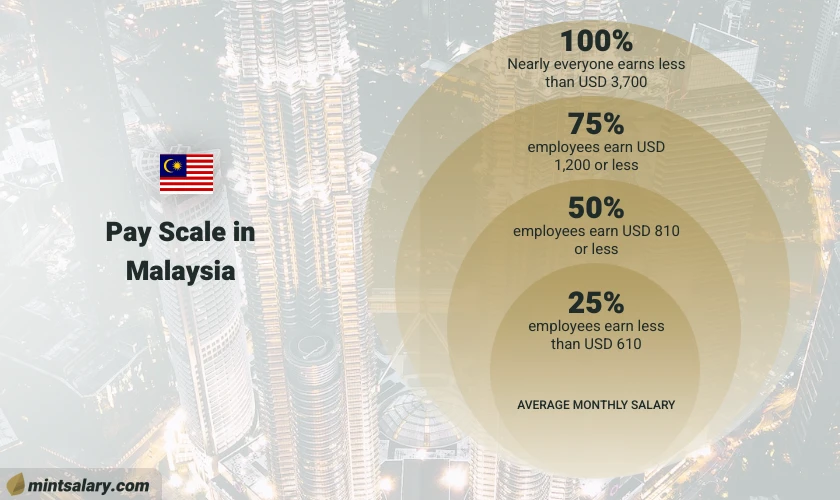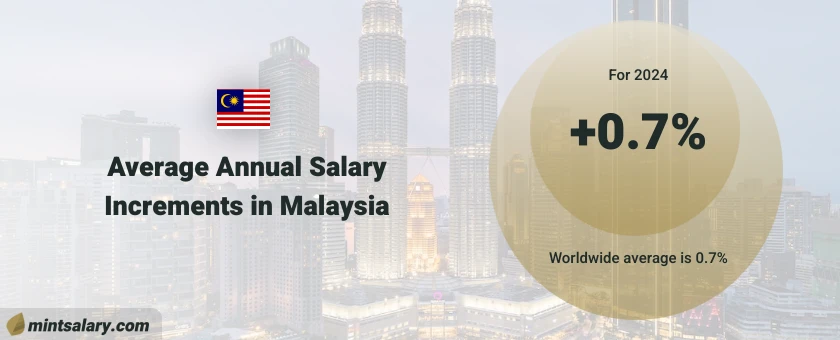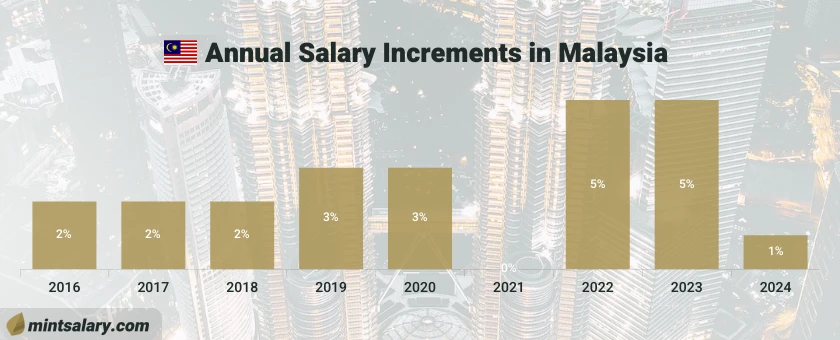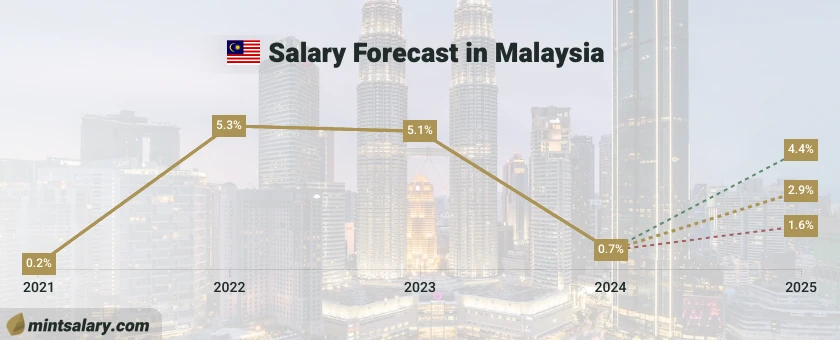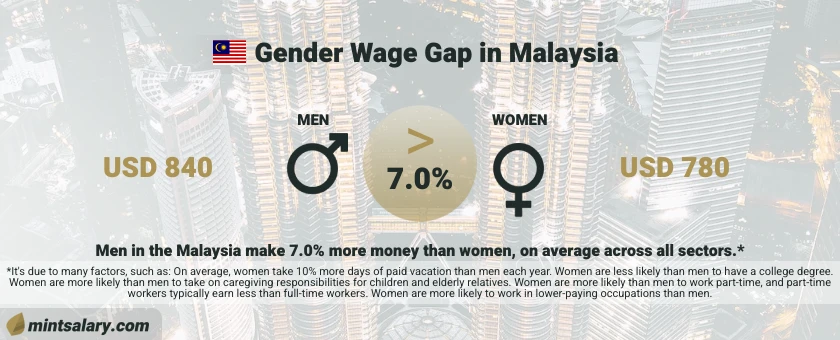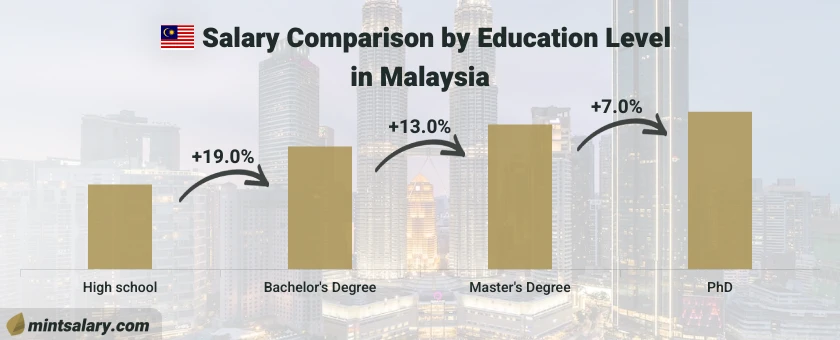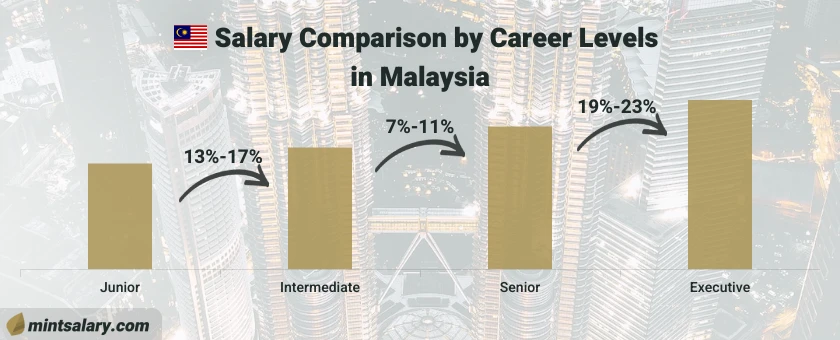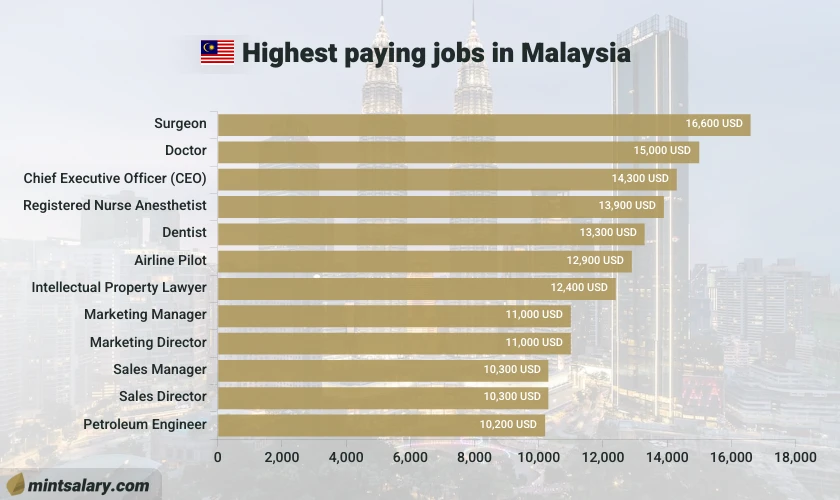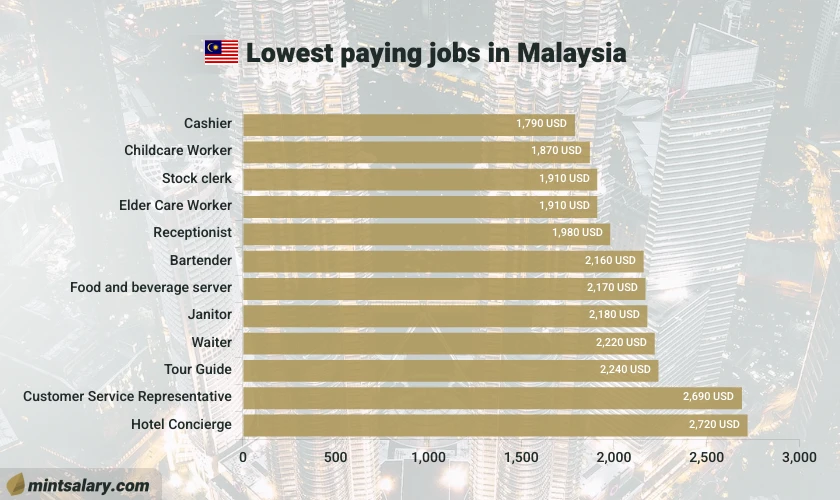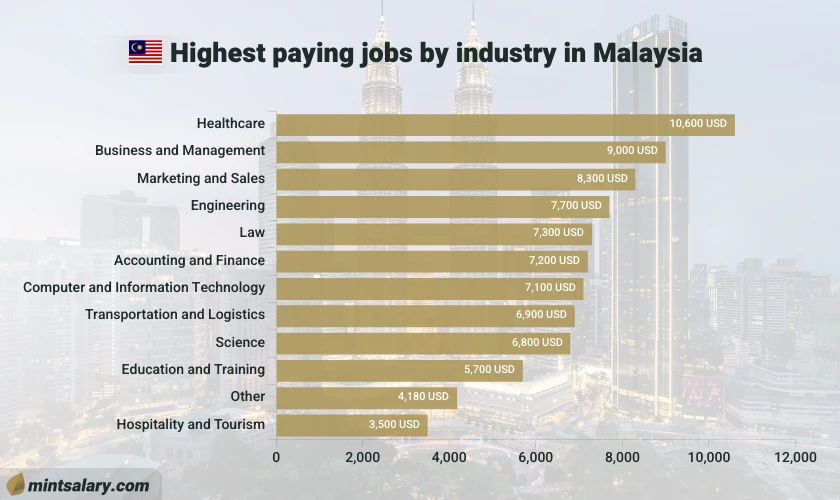Average Salary in Malaysia 2024
Discover the intricate salary landscape in Malaysia with this comprehensive article. Delve into the pay scale, wage gap, yearly increments, and breakdown of salaries based on education level or years of experience. Get profound insights into the Malaysian job market, empowering you to make informed decisions and navigate towards a fulfilling career path.
Please be aware that the data we are providing is as accurate as possible at this early stage of the year 2024.
However, as we gather more data for 2024, we make adjustments to ensure the highest level of precision.
However, as we gather more data for 2024, we make adjustments to ensure the highest level of precision.
What is the average salary in Malaysia in 2024?
What is the average salary in Malaysia in 2024?
840USD
(USD 10,100 yearly)
Low
380
USD
Average
840
USD
High
3,700
USD
If you work in Malaysia, your average salary will be approximately USD 840 per month. Salaries can vary, with the lowest average at USD 380 and the highest average at USD 3,700 (actual maximum salary is higher). The mentioned salary includes housing, transport, and other benefits. There is a significant salary disparity between different careers. For specific job titles and their corresponding salaries, please refer below.
Pay Scale and Salaries in Malaysia
Pay Scale Comparison and Salary Structure
Salary Structure
Nearly everyone earns less than USD 3,700, 75% of the people earn USD 1,200 or less. 50% employees earn less USD 810 or less, 25% of the employees earn less than USD 610.Minimum Wage and Starting Salary
Minimum Wage and Starting Salary refers to the fundamental pay levels for entry-level positions. It encompasses the legally mandated minimum wage and the initial compensation offered to new hires, impacting job seekers and employers alike. Understanding these figures is crucial for ensuring fair labor practices and successful career beginnings. In Malaysia the minimum salary is USD 380.Median Salary
By considering the median salary in Malaysia of USD 660, one can understand the middle point of all salaries in a dataset. This measurement provides a fairer assessment of income distribution and is commonly employed to estimate average earnings in various professions and industries.Salary range and Percentile
Salary Range refers to the span between the lowest and highest salaries in a given dataset, indicating the scope of potential earnings. Percentile, on the other hand, represents a specific point in the range, showing how a salary compares to others in the dataset, making it useful for benchmarking pay levels. In Malaysia the salary ranges from USD 380 to USD 3,700.Annual Salary Increments in Malaysia
What is the average annual salary increment in the Malaysia? How frequently do employees receive salary raises?
In 2024 employees in Malaysia received around 0.7% salary increase. Please note that this is average across all job sectors. In comparison worldwide average for 2024 is 0.7%.Historical Graph of Annual Salary Increments in Malaysia
In recent years, the salary of employees in Malaysia has witnessed an average yearly increase of 2.5%. This corresponds to a range of 0.2% to 5.3% increment per year.Salary Forecast and Trends for the Future in Malaysia
There are several key factors that influence future of salary growth. That is why we provide range of most probable forecast of salary increments. During next year salary increment will most likely be around 2.9%. Estimated range is between 1.6% and 4.4%.Gender Wage Gap in Malaysia
What is the difference in pay between mens and womens? Men vs. women salary comparison.
The wage gap in Malaysia currently stands at 7.0%.
It's due to many factors, such as:
- Gender discrimination.
- On average, women take 10% extra days of paid vacation per year compared to men.
- Women are less likely than men to have a college degree.
- Men are less inclined than women to assume caregiving responsibilities for children and elderly relatives.
- Part-time employment is disproportionately dominated by women, who usually earn less than their full-time counterparts.
- In comparison to men, women are more likely to work in lower-paying occupations.
Salary Comparison by Education Level
How does the education level influence the amount of salary?
The Benefits of Transitioning from High School to a Bachelor's Degree
Completing high school and receiving a bachelor's degree present a multitude of benefits. First and foremost, they significantly enhance career prospects, leading to higher earning potential and broader access to job opportunities. Alongside financial advantages, pursuing a bachelor's degree fosters personal growth, develops critical thinking skills, and offers the chance to specialize in a particular field of interest. It also facilitates valuable networking opportunities and promotes the cultivation of a global perspective. Ultimately, the journey from high school to a bachelor's degree is a transformative path that opens doors to a more fulfilling and prosperous future.The Advantages of Progressing from a Bachelor's to a Master's Degree
Advancing from a bachelor's degree to a master's degree offers several compelling advantages. Firstly, it deepens one's expertise and knowledge in a specific field, making graduates highly sought-after specialists in their areas of study. This advanced education often leads to even greater earning potential and career advancement opportunities. Additionally, master's programs often emphasize research and critical thinking, honing these skills for practical application in professional settings. Networking opportunities expand further, connecting students with experts in their fields. Lastly, pursuing a master's degree is a significant personal achievement, reflecting dedication and a commitment to lifelong learning, which can contribute to personal growth and fulfillment.The Advantages of Advancing from a Master's to a Ph.D. Degree
Continuing from a master's degree to a Ph.D. brings numerous benefits. Firstly, it allows individuals to become true experts in their chosen fields, conducting groundbreaking research and contributing to the advancement of knowledge. This expertise often leads to prestigious career opportunities in academia, research, and leadership positions in various sectors. Ph.D. programs foster advanced critical thinking, problem-solving, and analytical skills, making graduates highly adaptable and innovative. Networking opportunities expand even further, with collaborations and connections in the global academic and professional communities. Pursuing a Ph.D. illustrates a profound commitment to expanding human understanding and forging a transformative and influential career.Salary Breakdown Based on Career Levels
How does an individual's salary evolve as time goes on?
Salary increase going from Junior to Intermediate
Promotion from junior to intermediate role brings increased responsibilities and expertise. Generally, salary rises significantly, often 13%-17% higher, reflecting higher skill level and value to the company.Elevation from Intermediate to Senior Role Brings Salary Advancement
Elevated from intermediate to senior role, responsibilities expand, along with a substantial salary hike of approximately 7%-11%. Expertise and leadership yield higher recognition and greater financial rewards.Executive Promotion: Salary Increase from Senior Position
Ascending from senior to executive role amplifies responsibilities. Typically, salary surges significantly, often 19%-23% higher, mirroring strategic influence and heightened leadership contributions.Average Hourly Wage in Malaysia
What is the average hourly wage in the Malaysia?
Average Hourly Wage
5USD
Low
2
USD
Average
5
USD
High
22
USD
What are the disadvantages of being paid on an hourly wage basis?
- Income instability: The irregular or fluctuating income from hourly wages may make it challenging to budget and plan for expenses.
- Limited earning potential: Hourly workers may face limitations in terms of the number of hours they can work, which can restrict their earning potential compared to salaried positions.
- Lack of benefits: Hourly workers often have fewer or limited benefits such as paid time off, health insurance, retirement plans, and other perks normally attributed to full-time employment.
- Inconsistent work hours: Hourly workers may experience unpredictable work schedules, including shifts that vary in duration or irregular hours, which can disrupt work-life balance and make it difficult to maintain consistent routines.
- Uncertain job security: Compared to salaried positions, job insecurity in hourly positions can increase as they are more susceptible to layoffs, downsizing, or changes in demand.
- Limited career advancement: In certain cases, hourly positions may have limited prospects for career progression, professional development, or upward mobility within the organization.
Highest and Lowest Paying Jobs in Malaysia
What are the best paying jobs in Malaysia?
Highest paying jobs Malaysia?
- Surgeon (USD 3,700)
- Doctor (USD 3,300)
- Chief Executive Officer (CEO) (USD 3,200)
- Registered Nurse Anesthetist (USD 3,100)
- Dentist (USD 3,000)
- Airline Pilot (USD 2,900)
- Intellectual Property Lawyer (USD 2,800)
- Marketing Manager (USD 2,500)
- Marketing Director (USD 2,500)
- Sales Director (USD 2,300)
- Sales Manager (USD 2,300)
- Petroleum Engineer (USD 2,300)
- Brand Manager (USD 2,200)
- Marketer (USD 2,200)
- Judge (USD 2,200)
- Treasurer (USD 2,200)
- Controller (USD 2,200)
- Pharmacist (USD 2,100)
- Tax Lawyer (USD 2,100)
- Lawyer (USD 2,100)
Lowest paying jobs Malaysia?
- Cashier (USD 400)
- Childcare Worker (USD 420)
- Stock clerk (USD 420)
- Elder Care Worker (USD 430)
- Receptionist (USD 440)
- Bartender (USD 480)
- Food and beverage server (USD 480)
- Janitor (USD 480)
- Waiter (USD 490)
- Tour Guide (USD 500)
- Customer Service Representative (USD 600)
- Hotel Concierge (USD 600)
- Rehabilitation Counselor (USD 610)
- Travel Agent (USD 660)
- Secretary (USD 680)
- Painter (USD 710)
- Carpenter (USD 730)
- Bus Driver (USD 750)
- Artist (USD 750)
- Truck Driver (USD 770)
Highest paying jobs by industry
- Healthcare (USD 2,400)
- Business and Management (USD 2,000)
- Marketing and Sales (USD 1,900)
- Engineering (USD 1,700)
- Law (USD 1,600)
- Accounting and Finance (USD 1,600)
- Computer and Information Technology (USD 1,600)
- Transportation and Logistics (USD 1,600)
- Science (USD 1,500)
- Education and Training (USD 1,300)
- Other (USD 920)
- Hospitality and Tourism (USD 770)
- Social Services (USD 630)
- Services (USD 580)
